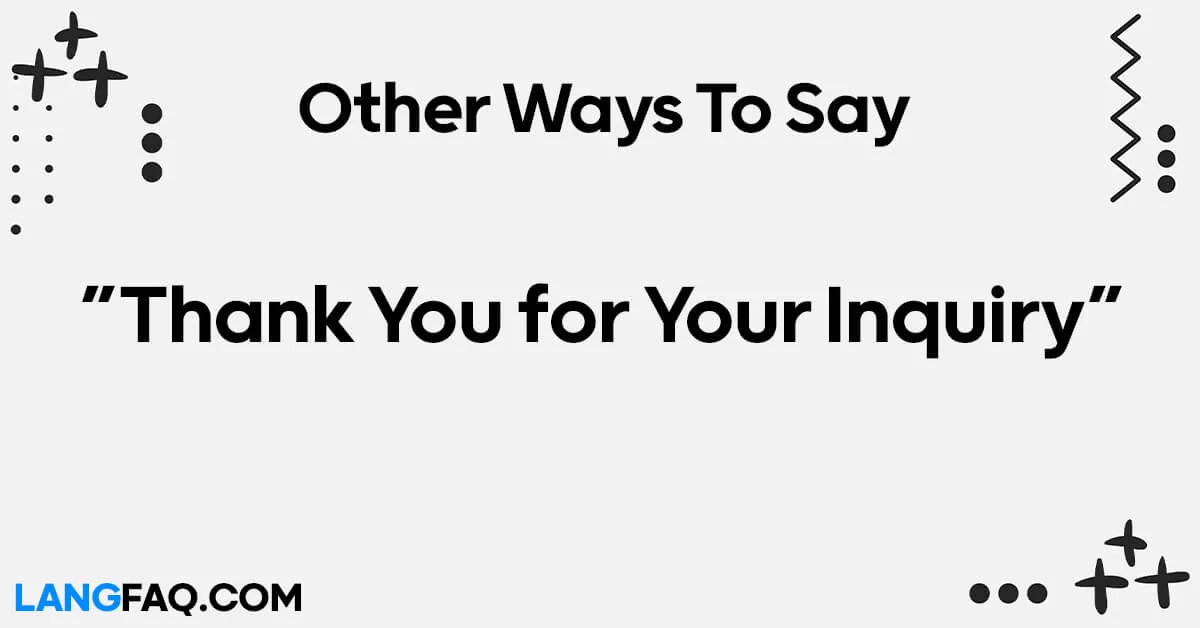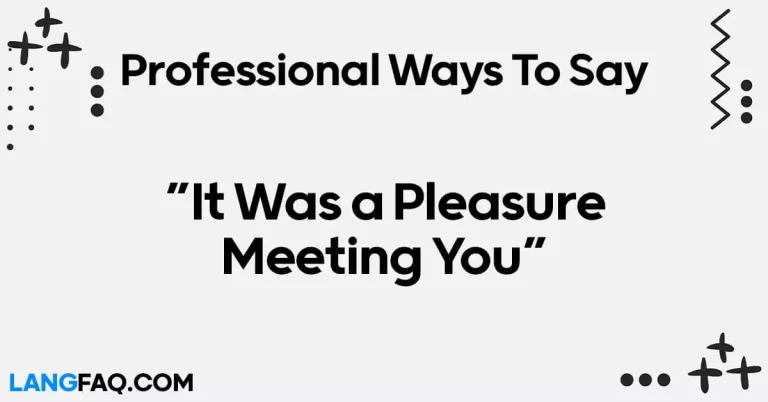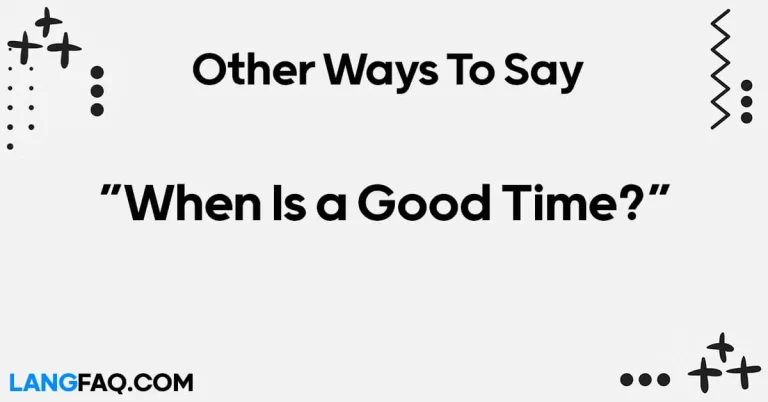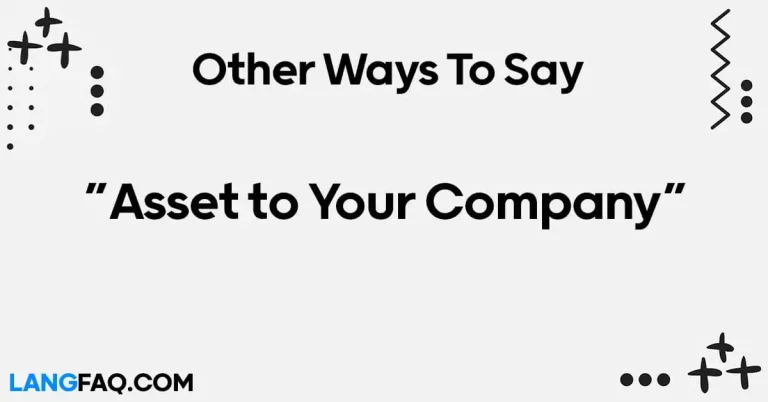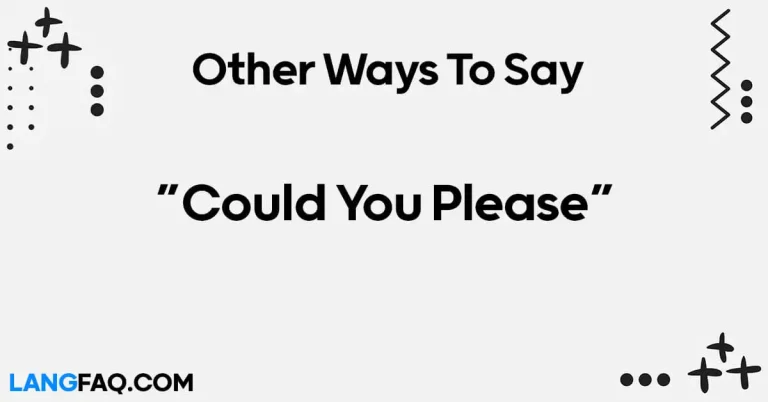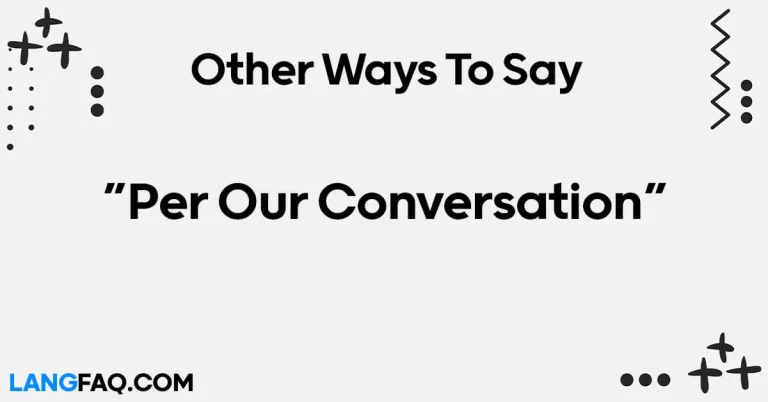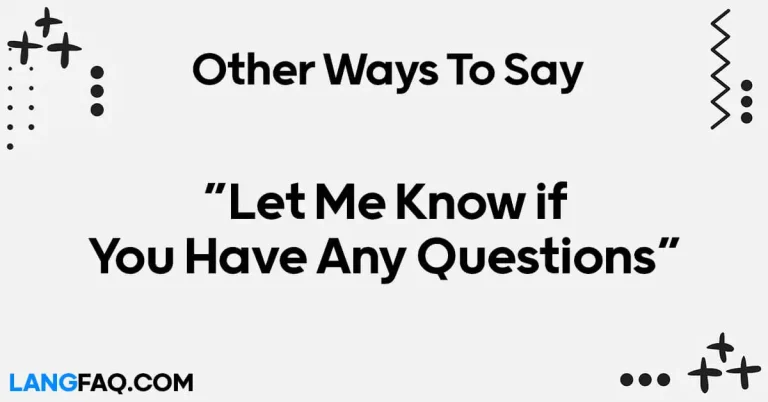In the fast-paced world of communication, expressing gratitude goes beyond the conventional “Thank You for Your Inquiry.” Elevate your responses with creativity and warmth. This article unveils 12 refreshing ways to express appreciation for inquiries, offering a blend of professionalism and friendliness.
12 Other Ways to Say “Thank You for Your Inquiry”
Here are 12 other ways to express gratitude for someone’s inquiry:
- Appreciate Your Interest: Thank you for expressing interest in our [product/service]. We value your curiosity.
- Your Inquiry Brightened Our Day: Your inquiry brought a smile to our faces. Thanks for reaching out!
- Heartfelt Thanks for Reaching Out: We sincerely appreciate you taking the time to inquire. Thank you!
- We’re Thrilled You Asked: Your question has ignited our excitement. Thanks a bunch for asking!
- Many Thanks for Your Curiosity: Your curiosity is commendable. Many thanks for your intriguing question.
- Grateful for Your Thoughtful Question: Your thoughtful question didn’t go unnoticed. We’re grateful for your engagement.
- Thanks a Bunch for Your Inquiry: Big thanks for your inquiry! We’re here to assist you.
- Your Question Sparks Inspiration: Your question has sparked inspiration. Thanks for contributing to our creative process.
- Kudos for Your Inquisitive Spirit: Kudos to your inquisitive spirit! We appreciate the depth of your inquiry.
- Thank You for Making Us Pause and Reflect: Your inquiry made us pause and reflect. Thank you for prompting thoughtful considerations.
- Your Inquiry is a Valuable Addition: We consider your inquiry a valuable addition to our discussions. Thank you for contributing.
- Inquiring Minds Like Yours Make a Difference: Inquiring minds like yours make a significant difference. Thank you for being an active part of our community.
Here’s a table with the meanings and examples of the 12 ways to say “Thank You for Your Inquiry”:
| Expression | Meaning | Example |
|---|---|---|
| Appreciate Your Interest | Expressing gratitude for someone’s interest in a topic. | “We appreciate your interest in our new product line.” |
| Your Inquiry Brightened Our Day | Conveying joy and positivity in response to an inquiry. | “Receiving your inquiry brightened our entire team’s day.” |
| Heartfelt Thanks for Reaching Out | Sincerely thanking someone for taking the initiative to inquire. | “Heartfelt thanks for reaching out to us with your questions.” |
| We’re Thrilled You Asked | Expressing excitement and enthusiasm in response to a question. | “We’re thrilled you asked such an engaging question.” |
| Many Thanks for Your Curiosity | Acknowledging and appreciating someone’s curiosity. | “Many thanks for your curiosity; it drives meaningful discussions.” |
| Grateful for Your Thoughtful Question | Expressing gratitude for a question that demonstrates thoughtfulness. | “We’re grateful for your thoughtful question; it adds depth to our conversation.” |
| Thanks a Bunch for Your Inquiry | Informal expression of gratitude for an inquiry. | “Thanks a bunch for your inquiry; we’re here to help.” |
| Your Question Sparks Inspiration | Recognizing a question that ignites creativity or new ideas. | “Your question sparks inspiration for our upcoming projects.” |
| Kudos for Your Inquisitive Spirit | Giving praise for someone’s inquisitive nature. | “Kudos for your inquisitive spirit; it encourages exploration.” |
| Thank You for Making Us Pause and Reflect | Acknowledging an inquiry that prompts reflection. | “Thank you for making us pause and reflect with your insightful question.” |
| Your Inquiry is a Valuable Addition | Recognizing an inquiry as a valuable contribution. | “We consider your inquiry a valuable addition to our discussions.” |
| Inquiring Minds Like Yours Make a Difference | Highlighting the positive impact of inquisitive individuals. | “Inquiring minds like yours make a significant difference in our community.” |
These 12 alternative expressions offer a diverse and nuanced approach to expressing gratitude for inquiries. Whether you’re aiming for a professional tone, injecting warmth and positivity, or acknowledging the value of curiosity, these phrases provide a rich tapestry of ways to thank someone for their engagement. By incorporating these expressions into your responses, you not only convey appreciation but also personalize your communication, fostering stronger connections in both professional and personal interactions.
Is It Correct to Say “Thank You for Your Inquiry”?
Yes, “Thank You for Your Inquiry” is a correct and widely accepted expression. It is a polite and formal way to acknowledge someone’s interest or request for information. This phrase is commonly used in professional and business settings when responding to inquiries, whether they are related to products, services, or general information.
Using this expression conveys gratitude for the individual’s interest, and it sets a positive tone for further communication. It’s a courteous way to let the person know that their inquiry is appreciated and that you are ready and willing to provide the information or assistance they are seeking.
In various professional contexts, you may also come across variations of this expression, such as “Thank you for reaching out” or “Thank you for getting in touch,” which serve the same purpose of expressing appreciation for the inquiry. The choice of wording can depend on the specific nature of the communication and the relationship between the parties involved.
Professional Mail Example With “Thank You for Your Inquiry”
Subject: Appreciation for Your Inquiry
Dear [Recipient’s Name],
I hope this email finds you well.
Thank you for your recent inquiry regarding [specific topic/product/service]. We appreciate your interest and the opportunity to provide you with the information you are seeking.
In response to your inquiry, please find attached a detailed document outlining [relevant details, information, or materials]. We believe this will address your questions and provide the clarity you are looking for.
If you have any further queries or require additional information, please do not hesitate to reach out. We are committed to ensuring that all your questions are answered thoroughly.
Once again, thank you for considering [Your Company/Organization] for your [product/service] needs. We look forward to the possibility of serving you and meeting your requirements.
Best regards,
[Your Full Name] [Your Position] [Your Contact Information] [Company Name] [Company Address]
Appreciate Your Interest
Expressing gratitude for someone’s interest is more than a courtesy; it’s a genuine acknowledgment that can deepen connections. In both formal and informal contexts, this phrase is versatile and conveys appreciation for engagement.
When to Use:
- Formal Context: After receiving a professional inquiry or business-related question.
- Informal Context: When friends or acquaintances express interest in a personal matter.
Example Sentence:
Formal: “Dear [Name], We appreciate your interest in our recent product launch. Your engagement means a lot to us, and we are here to provide any additional information you may need.”
Informal: “Hey [Friend’s Name], I appreciate your interest in my upcoming project! It’s always great to have friends who are genuinely curious about what we’re up to.”
Email Sample:
Subject: Appreciation for Your Interest
Dear [Name],
Thank you for your inquiry regarding [specific topic]. We appreciate your interest and are thrilled to provide you with more details. Please find the information attached.
Best regards,
[Your Name]
Dictionary Insight:
The word “appreciate” stems from the Latin word ‘appretiare,’ meaning ‘to set a price on’ or ‘to value.’
Tips:
- Personalize the response by mentioning specific aspects of the inquiry.
- Use a professional tone in formal communications and a friendly tone in informal ones.
Your Inquiry Brightened Our Day
Adding positivity to your gratitude can create a lasting impression. This expression goes beyond the standard acknowledgment, infusing warmth and joy into your response.
When to Use:
- Formal Context: When responding to inquiries that bring a positive impact to the organization.
- Informal Context: Especially effective in friendly or casual interactions.
Example Sentence:
Formal: “Dear [Name], Your inquiry has truly brightened our day. It’s inspiring to see such thoughtful questions that contribute positively to our ongoing projects.”
Informal: “Hi [Friend’s Name], Your question totally brightened my day! It’s awesome to have friends like you who add sunshine to everything.”
Email Sample:
Subject: Your Positive Impact
Dear [Name],
Your recent inquiry brought a smile to our faces. We appreciate the positivity you bring to the conversation. Here’s the information you requested.
Best regards,
[Your Name]
Dictionary Insight:
The term “brightened” is derived from the Old English word ‘beorht,’ meaning ‘bright’ or ‘shining.’
Tips:
- Tailor the level of positivity to match the context and relationship.
- Use exclamation marks sparingly in formal contexts.
Heartfelt Thanks for Reaching Out
Infuse sincerity into your expressions of gratitude by using the phrase “heartfelt thanks for reaching out.” This conveys a genuine appreciation for the effort made by the inquirer.
When to Use:
- Formal Context: In professional settings, especially when responding to significant inquiries.
- Informal Context: Suitable for friends or colleagues when expressing appreciation for personal queries.
Example Sentence:
Formal: “Dear [Name], Our heartfelt thanks for reaching out with your inquiry. Your engagement is pivotal to the success of our ongoing projects.”
Informal: “Hey [Friend’s Name], I wanted to express my heartfelt thanks for reaching out. Your questions are always so thoughtful, and I appreciate our discussions.”
Email Sample:
Subject: Heartfelt Thanks for Your Inquiry
Dear [Name],
Heartfelt thanks for reaching out with your recent inquiry. Your curiosity and engagement are valued. Please find the requested information attached.
Warm regards,
[Your Name]
Dictionary Insight:
“Heartfelt” is a compound word, combining ‘heart’ and ‘felt,’ emphasizing a deep and sincere sentiment.
Tips:
- Use this phrase sparingly to maintain its genuine impact.
- Connect the appreciation to the broader context of the conversation.
We’re Thrilled You Asked
Injecting enthusiasm into your response can enhance the engagement and make the inquirer feel valued. “We’re thrilled you asked” goes beyond the standard acknowledgment, expressing excitement about the posed question.
When to Use:
- Formal Context: Ideal for inquiries that spark excitement or contribute positively to ongoing projects.
- Informal Context: Perfect for expressing genuine enthusiasm in friendly or casual interactions.
Example Sentence:
Formal: “Dear [Name], We’re thrilled you asked such an engaging question. Your curiosity adds tremendous value to our collaborative efforts.”
Informal: “Hi [Friend’s Name], We’re thrilled you asked about the upcoming event! Your interest makes the planning even more exciting.”
Email Sample:
Subject: Thrilled by Your Inquiry
Dear [Name],
We’re thrilled you asked such a compelling question. Your curiosity is contagious, and we’re excited to share more details with you. Please find the information attached.
Excitedly,
[Your Name]
Dictionary Insight:
The term “thrilled” is derived from the Middle English word ‘thirlen,’ meaning ‘to pierce’ or ‘penetrate,’ indicating an intense emotion.
Tips:
- Tailor the level of enthusiasm to match the nature of the inquiry.
- Use exclamation marks judiciously in professional emails.
Many Thanks for Your Curiosity
Expressing appreciation for someone’s curiosity demonstrates an understanding of the value curiosity brings to the conversation. “Many thanks for your curiosity” goes beyond a simple acknowledgment, acknowledging the positive trait of curiosity.
When to Use:
- Formal Context: Appropriate for inquiries that showcase intellectual curiosity and contribute positively to discussions.
- Informal Context: Suitable for friends or colleagues to appreciate and encourage a curious mindset.
Example Sentence:
Formal: “Dear [Name], Many thanks for your curiosity. Your insightful questions contribute immensely to the depth of our discussions.”
Informal: “Hey [Friend’s Name], Many thanks for your curiosity about my new project! It’s great to have friends who are genuinely interested.”
Email Sample:
Subject: Thanks for Your Curiosity
Dear [Name],
Many thanks for your curiosity regarding [topic]. Your questions add depth to our discussions, and we appreciate your engagement. Please find the requested information attached.
Best regards,
[Your Name]
Dictionary Insight:
The word “curiosity” originates from the Latin word ‘curiosus,’ meaning ‘careful’ or ‘solicitous,’ reflecting an eagerness to know.
Tips:
- Acknowledge the positive trait of curiosity explicitly.
- Encourage further inquiries by expressing gratitude for curiosity.
Grateful for Your Thoughtful Question
Expressing gratitude for a thoughtful question goes beyond mere acknowledgment. It recognizes the effort and consideration put into framing the inquiry.
When to Use:
- Formal Context: Ideal for inquiries that demonstrate a deep understanding of the topic or prompt reflection.
- Informal Context: Suitable for expressing appreciation in personal or friendly discussions.
Example Sentence:
Formal: “Dear [Name], We are truly grateful for your thoughtful question. It reflects a level of understanding that contributes significantly to our ongoing projects.”
Informal: “Hi [Friend’s Name], I’m grateful for your thoughtful question about [topic]. It shows how much you understand, and I love discussing these things with you.”
Email Sample:
Subject: Grateful for Your Question
Dear [Name],
We are grateful for your thoughtful question. Your insights contribute immensely to our discussions. Please find the information you requested attached.
Appreciatively,
[Your Name]
Dictionary Insight:
The term “thoughtful” originates from the Old English word ‘thōhtful,’ meaning ‘full of thought’ or ‘reflective.’
Tips:
- Explicitly mention the thoughtfulness of the question.
- Link the thoughtfulness to the broader context of the conversation or project.
Thanks a Bunch for Your Inquiry
Adding a touch of informality, “Thanks a bunch for your inquiry” is an expression that lightens the tone. It is especially effective in creating a friendly atmosphere and making the inquirer feel comfortable.
When to Use:
- Formal Context: Use sparingly in more relaxed professional settings.
- Informal Context: Perfect for expressing genuine appreciation in friendly or casual interactions.
Example Sentence:
Formal: “Dear [Name], Thanks a bunch for your inquiry! Your engagement brings a positive vibe to our discussions.”
Informal: “Hey [Friend’s Name], Thanks a bunch for asking about [topic]! It’s always a pleasure discussing things with you.”
Email Sample:
Subject: Thanks a Bunch for Your Inquiry
Dear [Name],
Thanks a bunch for your inquiry! Your questions are always welcome, and we’re here to assist. Please find the information attached.
Warm regards,
[Your Name]
Dictionary Insight:
The term “bunch” originated from Middle English, meaning a cluster or a group, and later evolved to imply a large amount.
Tips:
- Use this expression in situations where a more casual tone is appropriate.
- Gauge the formality of your response based on the nature of the inquiry.
Your Question Sparks Inspiration
Acknowledging the inspirational aspect of a question adds depth to your gratitude. “Your question sparks inspiration” communicates that the inquiry has triggered creative thoughts or prompted new ideas.
When to Use:
- Formal Context: Suitable for inquiries that lead to innovative thinking or contribute to ongoing projects.
- Informal Context: Effective when expressing appreciation for questions that stimulate creativity in personal or friendly discussions.
Example Sentence:
Formal: “Dear [Name], Your question sparks inspiration, driving us to explore new and innovative solutions. Thank you for your valuable contribution.”
Informal: “Hi [Friend’s Name], Your question about [topic] really sparks inspiration! It got me thinking about some exciting ideas.”
Email Sample:
Subject: Your Inspirational Question
Dear [Name],
Your recent question has sparked inspiration within our team. We appreciate your valuable contributions to the ongoing discussions. Please find the information attached.
Creatively yours,
[Your Name]
Dictionary Insight:
The word “inspiration” comes from the Latin word ‘inspiratio,’ meaning ‘a breathing into’ or ‘divine guidance.’
Tips:
- Link the inspiration to specific aspects of the inquiry.
- Encourage further innovative thinking or contributions.
Kudos for Your Inquisitive Spirit
Offering kudos for an inquisitive spirit is a way of praising curiosity. “Kudos for your inquisitive spirit” acknowledges the value of asking questions and encourages continued engagement.
When to Use:
- Formal Context: Suitable for professional settings where an inquisitive mindset is highly valued.
- Informal Context: Perfect for expressing appreciation for a friend or colleague’s curiosity.
Example Sentence:
Formal: “Dear [Name], Kudos for your inquisitive spirit! Your curiosity is instrumental in fostering a culture of continuous learning and improvement.”
Informal: “Hey [Friend’s Name], Kudos for always being so inquisitive! Your curiosity makes our discussions so much more interesting.”
Email Sample:
Subject: Kudos for Your Curiosity
Dear [Name],
Kudos for your inquisitive spirit! Your questions add depth to our conversations, and we appreciate your active engagement. Please find the information attached.
Appreciatively,
[Your Name]
Dictionary Insight:
“Kudos” is borrowed from Greek, meaning praise, honor, or acclaim for an achievement.
Tips:
- Use this phrase to positively reinforce a culture of curiosity.
- Acknowledge the value of inquisitiveness in personal or professional growth.
Thank You for Making Us Pause and Reflect
Expressing appreciation for inquiries that prompt reflection adds a layer of depth to your response. “Thank you for making us pause and reflect” conveys that the question has led to contemplation and thoughtful consideration.
When to Use:
- Formal Context: Appropriate for inquiries that encourage introspection or contribute to strategic decision-making.
- Informal Context: Suitable for personal or friendly discussions where a more profound response is desired.
Example Sentence:
Formal: “Dear [Name], Thank you for making us pause and reflect with your insightful question. It has prompted valuable contemplation that will influence our strategic direction.”
Informal: “Hi [Friend’s Name], Thank you for making us pause and reflect on [topic]. Your question really got us thinking, and it led to some interesting insights.”
Email Sample:
Subject: Gratitude for Your Thoughtful Inquiry
Dear [Name],
Thank you for making us pause and reflect with your insightful question. Your inquiry has sparked valuable contemplation, and we’re excited to share our reflections with you. Please find the information attached.
Reflectively,
[Your Name]
Dictionary Insight:
The phrase “pause and reflect” emphasizes taking a moment to consider and ponder deeply.
Tips:
- Explicitly mention the impact of the inquiry on reflection.
- Share insights or reflections prompted by the question.
Your Inquiry is a Valuable Addition
Conveying that an inquiry is a valuable addition acknowledges its significance in the broader context. “Your inquiry is a valuable addition” communicates that the question contributes positively to discussions or projects.
When to Use:
- Formal Context: Ideal for inquiries that bring unique perspectives or enhance the overall quality of ongoing projects.
- Informal Context: Suitable for expressing appreciation for a friend or colleague’s valuable contributions to discussions.
Example Sentence:
Formal: “Dear [Name], Your inquiry is a valuable addition to our discussions. The unique perspective you bring enriches the depth and quality of our ongoing projects.”
Informal: “Hey [Friend’s Name], Your inquiry about [topic] is a valuable addition to our conversations! I always appreciate your insightful contributions.”
Email Sample:
Subject: Your Valuable Contribution
Dear [Name],
Your recent inquiry is a valuable addition to our discussions. We appreciate the unique perspectives you bring. Please find the requested information attached.
Appreciatively,
[Your Name]
Dictionary Insight:
The term “valuable” comes from the Latin word ‘valere,’ meaning ‘to be strong’ or ‘to be worth.’
Tips:
- Highlight the specific ways in which the inquiry adds value.
- Encourage further contributions by expressing gratitude for the addition.
Inquiring Minds Like Yours Make a Difference
Ending on a positive note, “Inquiring minds like yours make a difference” emphasizes the impact of curiosity. This expression fosters a sense of community and shared learning.
When to Use:
- Formal Context: Suitable for acknowledging the positive influence of inquisitive minds on organizational culture.
- Informal Context: Perfect for expressing appreciation for a friend or colleague’s role in creating an engaging and learning-oriented atmosphere.
Example Sentence:
Formal: “Dear [Name], Inquiring minds like yours make a significant difference in shaping our organizational culture. Your curiosity contributes to a dynamic and innovative environment.”
Informal: “Hi [Friend’s Name], Inquiring minds like yours make a difference! I love our discussions, and your curiosity adds so much to our shared learning.”
Email Sample:
Subject: Your Impactful Curiosity
Dear [Name],
Inquiring minds like yours make a significant difference. Your curiosity is valued, and it adds vibrancy to our discussions. Please find the information you requested attached.
Curiously,
[Your Name]
Dictionary Insight:
The phrase “make a difference” implies having a positive impact or effect on something.
Tips:
- Acknowledge the broader impact of curiosity on the environment.
- Encourage a continued spirit of inquiry by expressing the positive difference it makes.
FAQs
Q: Are these expressions suitable for professional settings? Absolutely. While some are more casual, many can be adapted for professional contexts, adding a personalized touch to your interactions.
Q: How can I choose the right expression? Consider the nature of the inquiry and your relationship with the inquirer. Tailor your response to match the tone and context appropriately.
Q: Is it essential to use alternative expressions every time? No, but incorporating variety keeps your communication fresh. Reserve more creative expressions for special occasions or valued connections.
Q: Can I use these expressions in written communication? Certainly. Whether in emails, letters, or messages, these alternatives work well to convey gratitude effectively in written form.
Q: Are there cultural considerations for using alternative expressions? Yes, be mindful of cultural nuances. Choose expressions that align with the cultural norms of the person you’re communicating with.
Q: How can I make my gratitude more impactful? Personalize your expressions. Reference specific aspects of the inquiry to show genuine engagement and appreciation.
Conclusion
In a world inundated with routine responses, infusing gratitude with creativity can set you apart. Embrace these 12 alternative ways to say “Thank You for Your Inquiry” to enhance your communication, fostering connections that go beyond mere formality.

